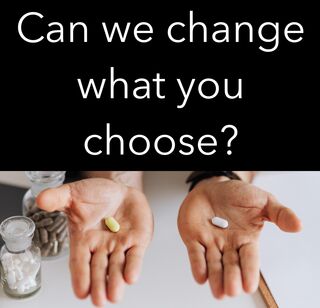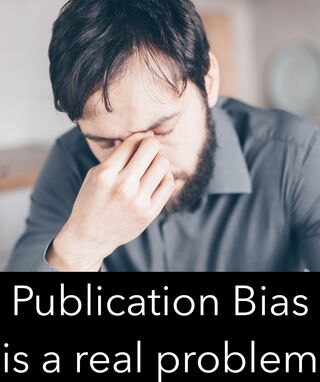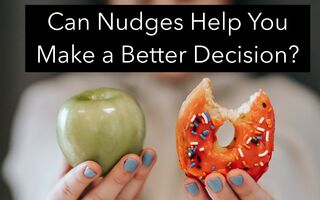Career
Do Nudges Work?
Evidence from a new meta-analysis calls the approach into question.
Posted July 25, 2022 Reviewed by Davia Sills
Key points
- Nudges are changes to how choices are presented that affect what kinds of decisions we make.
- Evidence from a new analysis suggests that, overall, nudges are not effective in changing behavior.
- This points to problems with publication bias: the tendency of scientists and journals to only publish results supporting a theory.
- However, nudges are such a broad category that asking whether all of them work is not practically useful.

Nudges are the memorable label given to small changes in the way questions are asked that can have large behavioral effects. They come from the literature on psychology and behavioral economics, especially the work of Nobel Prize winner Daniel Kahneman and his former colleague Amos Tversky. They have typically been pitched as ways to use psychology to get people to make better decisions for themselves and for society. For example, research found that making organ donation the default option when people get a driver’s license—as opposed to making it something that people had to check a box to opt-in to—led to more organ donors in society as a whole. This is good for saving lives.
In the last two decades, nudges have become important to mainstream policymakers. For example, the UK government established a “Nudge Unit” in 2010 to help use insights about psychology to better inform public policy. In 2019, the head of the Australian Bureau of Statistics, David Gruen, gave a speech about the many ways the Australian government—and other governments, including Canada—were using nudges in developing policy. Recently, researchers attempted to conduct a thorough review of the statistical evidence for nudges. This involved interventions in lots of different areas, from health to food to finances. A new analysis of this nudge data suggests there is no reliable evidence that nudges work.
The new analysis takes into account something that was not given enough weight in earlier analyses: publication bias. Publication bias is a well-known problem to researchers in many fields, from medicine to psychology to economics. It involves publishing only results that support a theory or hypothesis and not reporting or publishing results that might contradict it. This is like saying a baseball player is a great hitter because he got 10 hits—without taking into account how many times he went hitless. Did he get 10 hits out of 20 tries? Out of 50? 100? Knowing how often a theory or experiment doesn’t work is key to deciding whether it might be right.

If you’ve followed this blog for some time, you won’t be surprised to hear that a “hot topic” is that social science has a problem with biased scientific literature. The current peer-review system in science, while certainly being better than relying on your favorite pundit’s substack, is flawed. It is biased towards publishing flashy and exciting findings and against publishing correctives that show prior results that might not have been right. There has been an active movement in psychology and other disciplines for over a decade, working to put in place reforms that will improve the quality of the scientific literature. The research literature on nudges seems like it could use a strong dose of these reforms so that it gets a more balanced view of what is and isn’t working.
So do nudges really work?
Ordinarily, I’d end a post like this with a summary warning: Beware, this research literature isn’t trustworthy. Maybe nudges don’t work after all. But that’s not how I feel after reading this new result. Instead, I’m frustrated with the question.
What are nudges? Any instances where we can use psychology to change decisions? Does this new meta-analysis mean that, overall, attempts to apply psychology to influence decision-making don’t work? No. There are clearly psychological factors that influence our decision-making. The addictiveness of social media platforms should tell you that big tech companies have at least figured out a few tricks for influencing our clicks and views.
Asking whether “nudges work” is like asking whether “medicines work.” The category is too broad to be meaningful. Some medicines do, and some (especially medicines still being researched) don't. Even diving into the individual areas of nudge research (like food choices) doesn’t get specific enough. What we really need to assess is whether specific theories are right or wrong.
For example, Tversky and Kahneman wrote about “prospect theory,” which specifies the way that people treat losses differently from gains. (For example, you might make decisions about getting money differently from decisions about losing money.) That’s something that’s focused enough that we can really dig in and see if it holds. (In general, replications have supported Tversky and Kahneman’s research.)

Digging into the example of food choices, we might have one theory that says “habit is a big part of people’s food choices, so paying someone to eat extra vegetables every day for a month is likely to lead to their being healthier even a year later.” Another theory might say that “people like to have a full plate, so you can get them to eat less by giving them smaller plates.” If we analyze the results of studies looking at both of these questions together, what do we learn? Maybe one theory was right, and the other was wrong—but when you combine the results, it looks like “nudges of food choices don’t work.” That would be the wrong thing to conclude. One idea is right; the other isn’t. We need separate tests of each theory.
However, there is one common thread in nudge research that I think should be addressed. Some nudge research seems to be based on the idea that people are irrational and refuse to make decisions that would really benefit them—and so expert policymakers need to “trick” them into making better decisions for themselves by changing the types of questions they ask. In general, however, I believe that people are good at understanding what they want and need and evaluating whether a decision helps or hurts them.
Certainly, explaining things more clearly can be useful for people making decisions. Psychology research on how people understand different types of evidence (we aren’t very good at intuitively understanding statistics, for example) can help here. But nudge researchers should remember that once they’ve published their findings, anyone can read them. Once people read that experts are trying to shape their decisions, that can change what they do. They might decide that they agree with the researchers—or they might decide that they want to react against manipulation and choose the option that policymakers don’t like.
Ultimately, building theory around the idea that people are smart enough to understand the choices in their lives is one way to help make research more replicable. When the public learns what researchers have been up to, we are more willing to go along with approaches that aren’t manipulative.
References
Maier, M., Bartoš, F., Stanley, T. D., Shanks, D. R., Harris, A. J., & Wagenmakers, E. J. (2022). No evidence for nudging after adjusting for publication bias. Proceedings of the National Academy of Sciences, 119(31), e2200300119.
Fanelli, D. (2010). “Positive” results increase down the hierarchy of the sciences. PloS one, 5(4), e10068.




